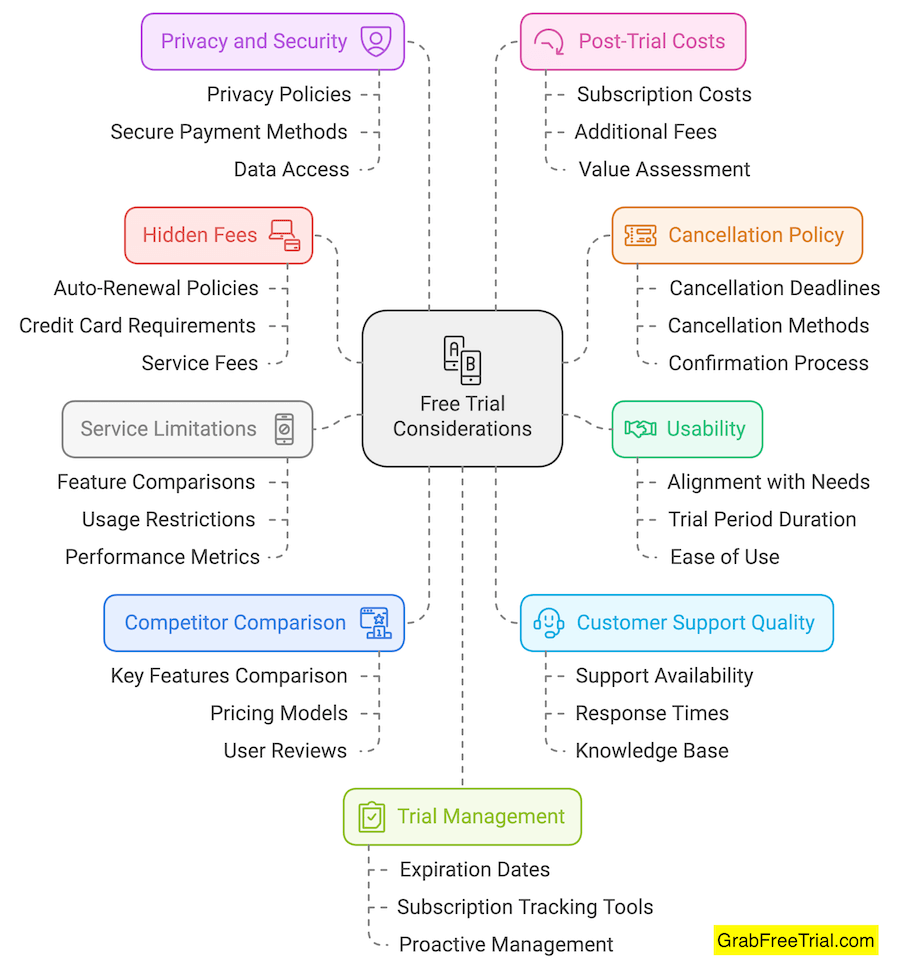Free trials give you a chance to test a product or service without immediate costs.
But not every trial is as straightforward as it seems.
To avoid surprises, here are 9 things to consider before starting a free trial.
Let’s make sure your trial experience is worth it!

1. Are There Hidden Costs?
Free trials sometimes have conditions that lead to unexpected charges.
Companies may ask for your credit card information and bill you when the trial ends if you forget to cancel.
Here’s how to avoid this:
- Read the terms and conditions carefully.
- Check if they charge any setup fees or add-on costs during the trial.
- Look for free trials that don’t require credit card details upfront.
Being aware of these conditions ensures you don’t accidentally end up paying for something you didn’t intend to buy.
2. Can You Cancel Easily?
Canceling a trial should be simple, but some services make it unnecessarily hard.
If canceling takes too much effort, you could end up paying for something you no longer want.
Here’s what to do:
- Look for trials that clearly explain the cancellation process.
- Check if you can cancel directly online without needing to contact support.
- Search for user reviews to see if others had difficulty canceling.
A good company will make it easy for you to opt-out without jumping through hoops.
3. Will You Use It?
Free trials can feel exciting, but will you genuinely use the service?
If you’re not sure, you might be wasting your time. Think about these points:
- Do you need this service right now?
- Will you have time during the trial period to explore its features?
- Does this product or service solve a real problem for you?
I’ve personally signed up for trials thinking I’d check them later, only to forget about them entirely. Don’t make the same mistake!
4. Are You Getting Full Access?
Some free trials only offer limited features, which can make it difficult to judge the service properly.
Before signing up, look at what’s included in the trial.
Here are a few tips:
- Check if important features are locked behind a paid upgrade.
- Look for comparison charts on the company’s website to see what’s missing in the trial.
- Choose trials that give you full access to the product or service for the best experience.
A trial not showcasing the core features isn’t worth your time.
5. Activate Similar Free Trials
Why settle for just one trial when you can try several similar services?
Testing them side by side helps you see which one fits your needs best. Here’s how to do it:
- Find competitors offering free trials for the same type of service.
- Sign up for multiple trials at the same time to compare them easily.
- Test each one based on:
- Features you need most.
- User interface and ease of use.
- Customer support and overall reliability.
For example, if you’re looking for a video editing tool, try out at least three options and pick the one that feels right for your workflow.
This approach ensures you’re making a well-rounded choice.
6. Is Customer Support Reliable?
Good customer support can make or break your trial experience.
If you encounter issues during the trial, you’ll want quick and helpful responses.
Here’s what to check:
- Does the company offer support to free trial users?
- Is there a live chat, email, or phone option available?
- How fast do they typically respond to questions?
Even during a trial, quality support shows that a company values its customers.
7. Is Your Data Secure?
Sharing your personal information is often required during free trials, but it’s important to know how your data is handled. Protect yourself by:
- Reviewing the company’s privacy policy to see how your data is stored and used.
- Avoiding trials that seem overly intrusive or ask for unnecessary details.
- Ensuring the website is secure (look for “https” in the URL).
Your privacy is priceless, so make sure the company respects it before sharing any information.
8. What Are the Costs After the Trial?
The trial might be free, but what happens next?
Understanding the pricing structure is key to avoiding surprises.
Here’s what to look for:
- Check if there are any discounts for first-time users after the trial.
- Look for flexible plans that let you cancel anytime.
- Compare the price with competitors to see if it’s reasonable.
Ask yourself, “Will this be worth the cost once the trial ends?” If not, it might not be worth starting in the first place.
9. Do You Have a Plan to Track It?
It’s easy to forget about a free trial once you’ve signed up, especially if you’re trying multiple services.
This can lead to unexpected charges. Here’s how to stay on top of things:
- Set reminders on your phone or calendar for the trial end date.
- Keep all trial-related emails in a separate folder for easy tracking.
- Create a simple checklist to evaluate each trial before it ends.
Being organized ensures you get the most out of the trial without unwanted surprises.
Final Thoughts

Free trials are a smart way to test products or services before committing, but only if you approach them with a plan.
By considering these nine points, you’ll avoid the common pitfalls and make the most of the trial period.
Also Read: